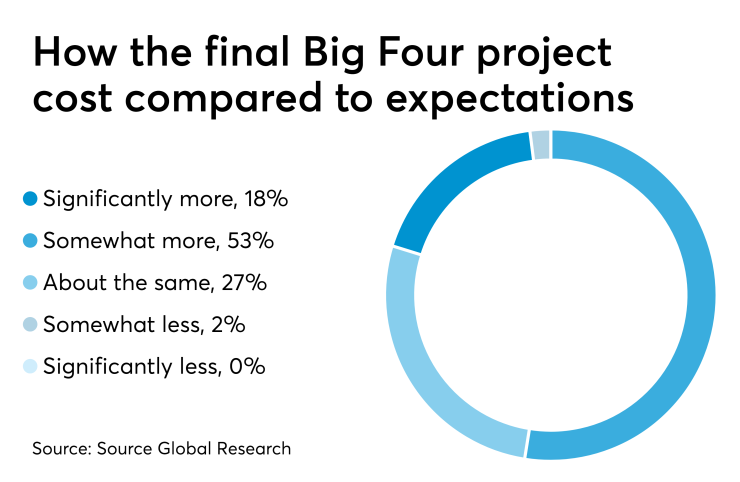Nearly three-quarters of Big Four consulting projects wind up costing more than U.S. companies anticipated, according to a new survey.
The survey, conducted by Source Global Research, found that U.S. companies generally expect to pay between $2,000 and $5,000 a day for a management consultant. But 70 percent of Big Four consulting projects end up costing more than the client’s initial estimate, while 18 percent of the projects cost significantly more, and only 2 percent end up costing less, according to the senior executives surveyed for the report.
Nevertheless, the Big Four were slightly less likely than major technology firms to overshoot client expectations for project costs, with 76 percent of technology firms’ projects turning out to be more expensive than the client anticipated them to be. Conversely, traditional management consulting firms like McKinsey, Bain & Company and Boston Consulting Group were the least likely to exceed client expectations on cost, with only 60 percent of their projects going over budget. The survey also found that 75 percent of U.S. companies made reasonable estimates of project costs before receiving any proposals from consulting firms.

For the report, Source Global Research surveyed U.S.-based senior executives from major organizations that had all been directly involved in buying and managing consulting projects. Seventy-four percent of the organizations studied had annual revenues of over $1 billion, with 23 percent over $5 billion.
Most of the clients believe consulting firms are setting their rates too high, according to the senior executives surveyed, with 74 percent of the respondents indicating that consultants don’t create enough value to justify the prices they charge. However, the survey also found it's the rule rather than the exception in the U.S. market for these rates to be discounted, with consulting firms offering clients some type of discount on 66 percent of projects. Big Four firms were actually most likely to offer discounts to clients, with 70 percent of their projects being discounted to some degree.
“This is an industry in which service providers routinely provide quotes that are well above client expectations,” said Fergus Blair, a senior analyst at Source Global Research, in a statement. "These quotes may then get negotiated downwards but still end up landing somewhere between the client’s initial estimate and what the consulting firm would ideally like to charge. Discounting is also playing a vital role in the U.S. consulting market, with our study finding that Big Four firms are offering some sort of discount on over two-thirds of their projects. When clients extract discounts from the consulting firms they negotiate with, they come away thinking that they have ‘beaten’ the market — even if the reality is that they are ending up with the same deal that everyone else is getting.”
More than three-quarters (79 percent) of the senior executives polled said all or most of their organization’s consulting contracts include some type of outcome-based element, while 88 percent plan to make more use of outcome-based pricing in the future. The two main reasons given by clients for why they want to do more outcome-based deals are to make consultants work harder (64 percent) and to ensure consulting firms staff their projects with only their best people (50 percent). Sixty-eight percent of Big Four projects examined in the research included an outcome-based element, suggesting their appetite for the practice was similar to that of management consulting firms (66 percent) but noticeably lower than leading technology firms (76 percent).
In addition, 96 percent of senior executives polled who had used outcome-based pricing said it had a positive effect on project outcomes, with 61 percent indicating it had a significantly positive effect, and 35 percent a somewhat positive effect, on the quality of the work delivered by the consulting firm.
“Outcome-based pricing works best where you have a direct relationship between the success of the project and revenue lift or cost reduction,” stated Matt David, partner and national service line leader for business model transformation at Deloitte. “This means it often works better for implementation projects than it does for strategy. And it’s why it’s so important to understand a client’s business case up front; if we understand their business case, then we can have a real conversation about where we would expect to see value delivered and how we would measure it.”
Representatives for PwC, KPMG and EY did not immediately respond to requests for comment.
An 84 percent majority of U.S.-based senior executives surveyed anticipate consulting fee rates to go up over the next five years, with the most commonly cited reasons for fee increases being greater demand for consultants to have specialist or technical skills (58 percent) and the increased use of proprietary tools and assets in the consulting process (45 percent). A similar proportion (80 percent) expect their overall spend on consulting projects to grow over the same period. Another recent Source report found that’s also true for shorter time frames, with 59 percent of clients predicting their spending on consulting projects would increase over the next 18 months.





